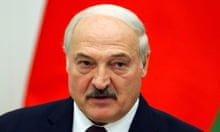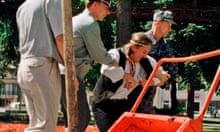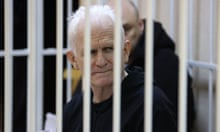The Belarusian sprinter Krystsina Tsimanouskaya is “safe” after arriving in Austria from Japan, where she had refused her team’s orders to return to Belarus because she feared she would face punishment for publicly criticising her coaches for their “negligence”.
Tsimanouskaya has received a humanitarian visa from Poland after she said Belarusian officials had attempted to bundle her on a plane during the Tokyo Olympics. She requested police protection at Haneda airport and later took refuge at the Polish embassy in Tokyo in a scandal that has rocked the Games, recalling high-profile defections of athletes during the cold war.
An athlete activist group aiding Tsimanouskaya and an Austrian government official who confirmed her arrival to Reuters said she was expected to fly to Warsaw later on Wednesday. She is expected to be reunited there with her husband, the athlete Arseniy Zdanevich, who also fled Belarus after Tsimanouskaya went public on Instagram with her appeals for help.
Tsimanouskaya was expected to take a direct flight to Warsaw but switched at the last minute, apparently as a security precaution because Belarusian state media and officials have called her a traitor.
“As we have indicated many times, for safety reasons we do not provide details of the flight route,” the Polish deputy foreign minister, Marcin Przydacz, said in a post on Twitter. He wrote that Tsimanouskaya was being taken care of by the Polish diplomatic service.
Belarusian political activists who have fled abroad have felt increasing pressure from the country’s authoritarian government in recent months. Ukraine’s president, Volodymyr Zelenskiy, ordered a security assessment on Wednesday of the risks Belarusian emigres face after a dissident activist was found hanged in a Kyiv park in an incident that police said may have been a “murder disguised as a suicide”.
Other prominent Belarusian athletes have said they feel unsafe to return to the country, where the leader, Alexander Lukashenko, has launched a harsh crackdown under which athletes have also been suspended for political opposition and even jailed.
The Belarusian heptathlete Yana Maksimava, who competed in the Olympic Games in 2008 and 2012, wrote that after the incident involving Tsimanouskaya, she and her husband would remain in Germany and not return to Belarus because of the pressure on the opposition.
“Unfortunately you can lose not just your freedom but also your life there,” she wrote in a post on Instagram, adding in public remarks that she felt unsafe returning to the country with her young daughter. “Here you can breathe easily and be one of those who fights for free speech of one’s friends, relatives, and those you are close to. We absolutely will win.”
Her husband, Andrei Krauchanka, who won a medal in the 2008 Beijing Games and has openly supported the protests against Lukashenko, was among those detained and beaten during protests last year.
Tsimanouskaya said in an interview with the Associated Press that officials from her team had made it clear she would face punishment if she returned home to an autocratic government that has relentlessly stifled any criticism.
Her refusal to return has refocused attention on human rights violations in Belarus, where Lukashenko has even grounded a plane flying from Greece to Lithuania to arrest a dissident journalist on board.
The International Olympic Committee said on Tuesday that it had launched a formal investigation into the case and was expecting a report from the Belarusian team.
Tsimanouskaya, 24, had been due to compete in the women’s 200-metre heats on Monday, but said the Belarusian head coach had turned up at her room at the athletes’ village on Sunday and told her she had to leave after she had criticised team officials.
On Wednesday, a trial began of Maria Kalesnikava, a leader of the opposition to Lukashenko, and of her lawyer Maxim Znak. The two are charged with conspiring to seize power and with threatening Belarus’ national security. If convicted, Kalesnikava could face 12 years in prison.
Friends, relatives and independent journalists were barred from the courtroom. The two were, however, filmed by Russian state media in a glass-enclosed dock, where Kalesnikava smiled and flashed a hand signal of a heart that was a symbol of the country’s mass protests that broke out a year ago.










